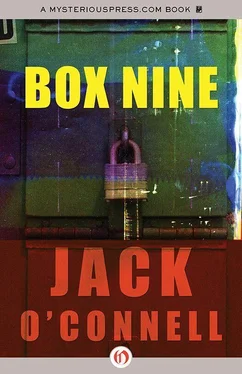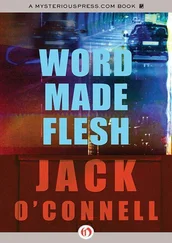He had suggested that they shower together. That she call Miskewitz, tell him she needed some sleep in order to keep going. That they push book piles aside and have a postcoital picnic on the floor of his library. He’d said he could make a huge gourmet omelette for two, something special, a surprise. He’d stroked her forehead and said she had to sleep soon, that it had been days since she’d really slept and that something could happen to her, emphasizing the word so that it conveyed a childlike fear, a dread of inconceivable monsters.
She’d lain in his arms and listened to him speak, kissed his chest, run her fingers over his bony cheeks. But she’d left the loft, still wet, her legs a little unindependable, her nervous system shorting out slightly, sending small blue flashes before her eyes as she found her way back to her car.
She knows she should have gone back to the green duplex, searched for a Valium, called in to the lieutenant for a break, collapsed into bed, and crashed. But instead she drove to Rollie’s Grill, intent on black coffee and overspiced food. And something else. Now, staring through the boxy, rectangular windows, she’s intent on studying Harry and Isabelle, on paying attention to their gestures, their mannerisms, the number of times they touch one another. She wonders about the sound of their voices as they speak to one another. She wonders if there’s a signal that two people give off when they’re bound together, committed in some old-time, superstitious way. Do they learn some difficult, shared language, some bizarre and insulated code only understood by the two bound parties? At night, in bed, at the end of the once-endless day, do they dispense with language entirely, fall into a lazy, sleepy telepathy? Do they utter sounds on a frequency that outsiders can’t hear? Do their inner organs vibrate when their mate comes within a certain perimeter? Like some birds, do they have an ability to will their own death when a spouse dies? Like swans? Like her parents?
There has never been anyone that Lenore felt this way about. She’s been involved with a number of boys and men over the past fifteen years. She has never felt rejected. Normally, she was the one who decided to sever a relationship. But even when she wasn’t the one who called it off, she always felt relief, never rejection. It was always like a great weight had been lifted.
But now images she can’t eliminate or adapt to are coming into her head, stuff so alien that she doesn’t know what to do with it: She sees herself moving into Woo’s cavernous loft, preparing to bake bread on his gleaming black counters, folding her freshly washed sweaters on the couch as he works at his ridiculous desk, instructing burly, ethnic moving men on where to put down the new bed. She sees herself and Woo hosting a small dinner, a homey, old-fashioned casserole of some kind, dense with noodles, cheese, multicolored vegetables. Woo sits at one end of the new teak table— we’ve got to lighten this place up a little, honey —and Ike, their sole guest this evening, sweet Ike, still having trouble renting out the empty half of the green duplex, sitting at the other end. And Lenore in the middle, equidistant from each, closest to the kitchen area so she can run the show, pull things from the oven and refrigerator, grab a new bottle from the wine rack. She sees her own mouth opening. Words come: Fred, honey, you should really take Ike up to the new courts with you next week. Ike, they’ve built some beautiful new racquetball courts up on the hill. Fred could show you the basics. It would really do you a world of good …
“What the fuck am I doing?” she says to herself, aloud, inside the Barracuda.
She jumps out of the car, starts to walk to the diner, then turns back, pulls open the door, and grabs the keys from the ignition slot.
A gust of steamy air hits her as she pulls open the metal door and steps inside the diner. Lon almost drops his rubber tub of dirty dishes trying to say hi to her. She slides into the first booth and nods hello. The table is littered with the debris from the last customers. There are two breakfast plates coated with the hardened yellow remains of fried eggs, large glasses with grainy traces of tomato juice, side bowls dusted with the last brown crumbs of Harry’s secret-seasoning home fries, toast crusts, orange rinds, coffee mugs. She guesses that both customers were men, probably truckers, possibly in their mid to late forties. Then she stops herself, annoyed that she can’t even take a seat in a lunchcar without reflexively analyzing the landscape like a crime scene. She can’t turn off being a detective, looking for the tiniest evidence that might reveal something more. But what? What is ever revealed that’s truly of use? It’s the process, the breaking apart of the immediate environment, sifting it fragment by fragment and looking at each particle from all perspectives, dusting it, photographing it, putting it down and picking it up again — this is what has become important to her. The method. The technique. The system. The idea that she can no longer sit in Rollie’s Grill without her mind taking over, shifting into an inspect-and-analyze mode, reconstructing a common diner-booth’s previous occupants — she finds this pathetic beyond words.
Behind the counter, Harry raises a full coffeepot toward her and she nods again. Lately, she’s noticed that inside the diner, communication is often assisted by the gesture and the hand signal accompanying normal, audible words. She assumes this is because of the number of different primary languages that all the inhabitants speak. As far as she knows, only Isabelle is terribly fluent in a second language.
Isabelle manages to get her instructions across to everyone. She snaps Spanish at her own extended brood, handles a beautiful, rhythmic English with the customers, and cuts what, by her own admission, is a broken, sometimes humorous Khmer dialect. She is the translator through whom all interracial communication must pass. She referees the fights between her Uncle Jorge and Harry’s cousin Lon.She relays Harry’s words about clean grill to her sister Luisa. She’s able to barter with both of the odd, lanky “sales reps” from both the Mekong Market and the New Ponce Bodega. And she’s able to keep Karl, the redneck milkman who calls the diner “the town’s own goddamn United Nations,” harmless and under control.
Lenore watches Isabelle now as she comes out of the storeroom wiping her hands on her apron. She’s a large woman, but she moves like someone half her weight and age. Though Lenore has to admit, she has no idea how old Isabelle actually is. Lenore envies her grace behind the counter, not just in the way she moves, the ease and agility of her body — Lenore thinks she could match that — but her easy manner of dealing with people. Lenore has never seen her blow up and yell. In any language. She’s never seen her grab the front of someone’s shirt or throw a water glass or serving spoon across the room. Even in those moments when the diner is packed to capacity during a dinner rush and boothfuls of college kids are screaming rude insults about their wait and cousin Lon has burned a second omelette and the dishwasher has started to leak again, Isabelle just dances through each crisis, attending to one thing at a time, cajoling the college boys with refills of coffee and her smooth voice, patting Lon on the back with a soft word to relax, even taking a monkey wrench to the bottom of the old Cleansomatic.
Lenore feels that put in the same position, she, too, could handle all the problems. But it’s the method that differs and how things are left in the wake of the job’s completion. It’s not a comfortable thought, because her method for dealing with all problems arises out of the core of her personality. Her schematic is simple — confront the problem and take the shortest, most direct route toward its solution. Every other consideration is superfluous. She’s never doubted this before. It’s been the first holy truth. The truth of truths. But in looking at Isabelle, she sees a woman — and it’s an important fact that she’s a woman — capable in an all-pervasive, almost primal way. And yet there’s no blood left in her wake, no jumpy casualties, no pockmarked landscape.
Читать дальше












